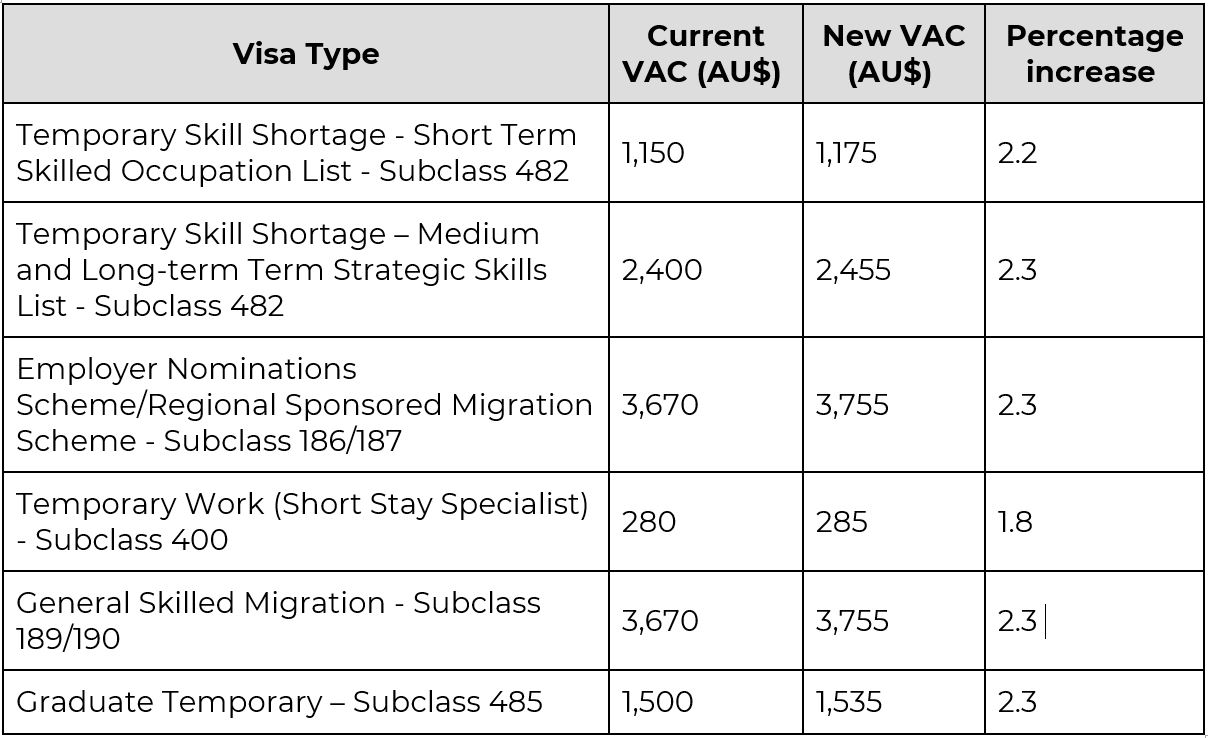- 1. Vietnam: Update on the duration of work permits in Ho Chi Minh City
- 2. Canada: Portugal added to International Experience Canada
- 3. Israel and U.S.: Reciprocal investor visa agreement approved by Knesset
- 4. Australia: Visa application charges increase
- 5. Kazakhstan: Simplified arrival process implemented
Vietnam: Update on the duration of work permits in Ho Chi Minh City

The Labor Authority in Ho Chi Minh City has clarified that the duration of a work permit as stated in the application cannot exceed the expiry date of the sponsoring entity’s business licence. A work permit can currently be authorized for up to two years.
This may effect representative offices whose business licences are generally issued for a period of between two to five years and may therefore be close to expiry. Larger companies will usually hold business licences valid for longer periods. Business licence renewal will take at least two months.
Background
Until earlier this month the Ho Chi Minh labour authorities were more flexible and would allow the work permit duration in the application to exceed the business licence validity, anticipating a renewal. There is no change for temporary residence cards and long-term visas for which the same regulation is already applied.
This update has been prepared using information obtained from Peregrine Immigration.
Disclaimer: The above information is provided for general information purposes only and should not be construed as legal advice. If you have any further inquiries regarding the applicability of this information, please contact Debra Jane Beynon, Regional Immigration Manager – APAC.
Canada: Portugal added to International Experience Canada

From 2019, Canada will add Portugal to the list of countries entitled to access the International Experience Canada (IEC) work permit program. Currently there are 33 countries participating in this program.
The IEC provides young people the opportunity to receive a work permit in Canada for a limited period of time, normally one year. Similar opportunities are available to Canadian citizens in countries that are part of the IEC program.
There are three types of IEC program, and the availability of each program depends on the arrangement with the applicant’s country of citizenship. The three programs are:
1. The Working Holiday program
This program provides for an open work permit for qualified applicants, typically between 18 and 35 years old.
2. The International Co-op program
This program is implemented for post-secondary students applying for a work placement/internship as part of their academic curriculum. An offer of employment is required.
3.The Young Professional program
This program is designed for post-secondary graduates in order to gain work experience in their fields. It requires a job offer from a Canadian employer in a related field.
Key considerations
This provides an opportunity for employers to hire a foreign national from Portugal where, otherwise, the case may have required a Labour Market Impact Assessment, or qualification in another work permit category.
At the same time, prospective Canadian workers will be able to take advantage of this program, where qualified, to secure temporary employment in Portugal.
This update was prepared using information obtained from Kranc Associates.
Disclaimer: The above information is provided for general information purposes only and should not be construed as legal advice. If you have any further inquiries regarding the applicability of this information, please contact Roberta Carnaccini, Global Operations Director – Immigration.
Israel and U.S.: Reciprocal investor visa agreement approved by Knesset

The Knesset, the Israeli legislature, have implemented a reciprocal agreement with the U.S. whereby, for the first time, U.S. nationals investing in Israel will be able to obtain a B-5 employment visa. Israeli nationals investing in the U.S. will in return be eligible for an E-2 Treaty Investor visa authorizing employment.
Key considerations
It will take time to implement this new agreement, but it is expected for Israeli and U.S. entities to be able to begin submitting E-2 and B-5 applications shortly.
This update was prepared using information obtained from Peregrine Immigration.
Disclaimer: The above information is provided for general information purposes only and should not be construed as legal advice. If you have any further inquiries regarding the applicability of this information, please contact Roberta Carnaccini, Global Operations Director – Immigration.
Australia: Visa application charges increase

Australia’s visa application charges (VAC) are set to increase for a number of visa categories lodged after July 1, 2018.
For many visa types, the fees have been increased in line with consumer price inflation (CPI). Changes to the common employment visa types are detailed below:

This summary was prepared using information obtained from the Department of Immigration and Border Protection.
Disclaimer: The above information is provided for general information purposes only and should not be construed as legal advice. If you have any further inquiries regarding the applicability of this information, please contact Debra Beynon, Regional Immigration Manager, APAC.
Kazakhstan: Simplified arrival process implemented

A simplified arrival process has been implemented for work and business visa holders entering Kazakhstan. The new process has abolished the below two steps, making the process after arrival much faster:
-
- Migration card – where previously foreign nationals had to complete a migration card with details about the purpose of stay, it will now be automatically registered in the Berkrut electronic national security database.
- Foreign nationals are no longer obligated to register their passport with the local migration police. Previously, this was required within five days of arrival.
Key considerations
In August 2018, the immigration authorities in Kazakhstan are expected to confirm whether the new rules will also apply to CIS nationals and visa-exempt nationals.
The Ministry of Internal Affairs is currently developing an online notification system for employers, The new system is expected to go live by October 2018.
This summary was prepared using information obtained from the Ministry of Foreign Affairs, Republic of Kazakhstan.
Disclaimer: The above information is provided for general information purposes only and should not be construed as legal advice. If you have any further inquiries regarding the applicability of this information, please contact Michele Giordani, Regional Immigration Manager, EMEA.




